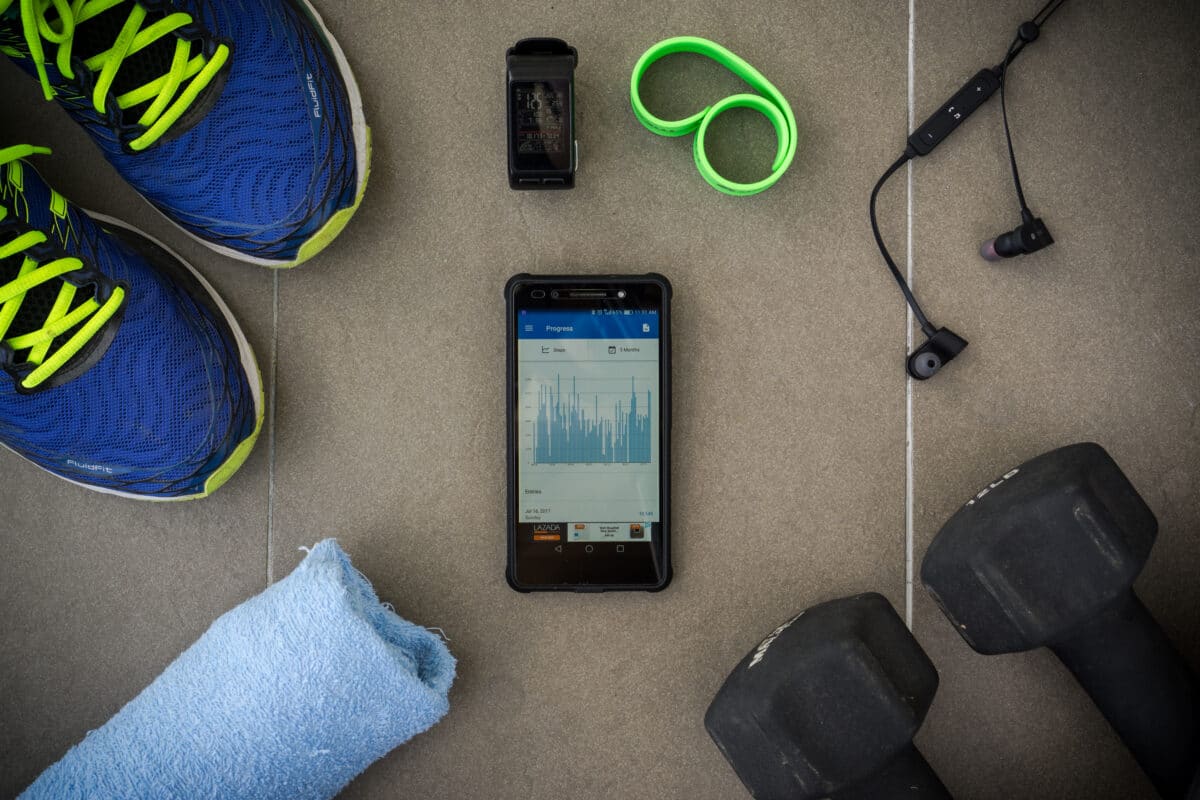
Your Fitness App May Sabotage Your Motivation, Study Suggests

(Photo by Krakenimages.com on Shutterstock)
In A Nutshell
- What the researchers actually looked at: 13,799 negatively toned posts on X about the five top-grossing fitness apps. The themes point to user-reported problems with targets, tracking, and how those features feel day to day.
- Why the numbers can backfire: People described calorie goals that felt unattainable, confusion over “exercise calories,” and warnings about ordinary foods. The result wasn’t better habits; it was second-guessing, hunger, and frustration.
- How it feels in real life: Notifications became nagging, streak resets erased months of effort, and small slip-ups felt like failure. Many users coped with humor, but the through-line was shame, avoidance, and lost motivation.
- What would likely work better: Designs that support autonomy and enjoyment, not just deficits and streaks. Think flexible goals that adapt to context, clearer feedback about accuracy, kinder streak rules, and prompts that encourage consistency without judgment.
Millions of people open fitness apps each day expecting motivation and support. Instead, many encounter something far more discouraging: daily calorie targets so low they joke about starving, algorithm-generated goals that ignore the realities of human biology, and rigid numerical targets that transform healthy eating into an exercise in shame and frustration.
An analysis of 13,799 negative-sentiment posts on X (formerly Twitter) reveals patterns of users struggling with the five highest-grossing fitness apps worldwide. Rather than supporting sustainable health changes, users described how the apps drove them away from healthy behaviors entirely, leaving them feeling defeated and ready to abandon their wellness efforts.
Researchers at University College London and Loughborough University collected 58,881 posts about these apps, then used machine-assisted topic analysis, combining artificial intelligence with human interpretation, to examine the 13,799 posts expressing negative experiences. What emerged was a pattern of users struggling not with their own willpower, but with app-generated targets they described as unattainable.
“So my fitness pal says if I want to reach my goal weight I need to consume −700 (negative 700) calories a day,” one user wrote, highlighting the absurdity of algorithmic recommendations. Another advised: “My Fitness Pal should be used for tracking calories ONLY. If you allow it to prescribe your calories you’ll end up with a deficit that’s unachievable, unsustainable and very unhealthy. You could also starve to death.”


How Apps Set Users Up for Failure
The problem starts with how these apps calculate daily targets. Users input their current weight and desired goal weight, and algorithms automatically generate daily calorie recommendations. But posts revealed that calculations often failed to account for biological realities or individual circumstances.
One breastfeeding mother described confusion when MyFitnessPal wouldn’t subtract calories for nursing. The researchers note that UK health authorities estimate breastfeeding burns approximately 500 calories daily—an expenditure the app couldn’t account for, making her daily target immediately unrealistic.
Other posts described how exercising paradoxically made targets harder to achieve. Users reported that apps would calculate calories burned during workouts, then adjust daily calorie intake recommendations downward to maintain a steep deficit, leaving them feeling penalized for physical activity and starving too often.
“help i just saw a reel of a woman saying that adding on MyFitnessPal the exercise calories are unnecessary bc the apo puts weird inexact amounts WICH MEANS I’VE BREN COUNTING ANYTHING BAD I HAVE NO CLUE HOW MUCH I BURN HELP,” one user wrote, their capitalized and error-prone panic reflecting genuine confusion about whether they could trust the app’s recommendations.
Posts also revealed frustration with how apps handled everyday foods. One user expressed exasperation after MyFitnessPal warned about sugar content in a banana: “a fu*king banana. Fu*k off.”
Users also reported technical glitches that compounded these frustrations: wildly different calorie counts when syncing the same workout across multiple apps, phone batteries dying mid-workout, and software crashes that erased hard-earned progress. One runner achieved a personal record for a half-marathon, only to have their phone die before the workout uploaded to Strava. “Shouldn’t matter… (but does),” they noted.
The Shame That Follows Impossible Standards
Unattainable goals also triggered shame in users. Many people described feeling pissed off or sick of app notifications asking them to log meals, particularly when they knew the food wouldn’t align with their targets.
“I just got a notification from my fitness pal reminding me to log my dinner for today but I don’t want to bc I’m ashamed I just ate dominos,” one user wrote. The app’s design, meant to encourage consistent tracking, instead became a source of judgment and anxiety.
Posts often took a darkly humorous tone. “Hate when my fitness pal asks why I haven’t logged my dinner! Haven’t logged my dinner mate cause I’ve ate a spice bag and milled a tub of Ben and Jerry’s leave me alone!”
While humor appeared as a coping mechanism, the posts revealed genuine emotional distress. Users felt pestered for eating normally, transforming a basic human need into a source of stress.
Users also expressed horror upon discovering the calorie content of favorite foods. One person described their reaction to learning about Percy Pigs, a popular UK candy: “Unless you want ruin a large part of your life…. Do NOT put Percy Pig sweets into MyFitnessPal. WHAT.THE.ACTUAL.F*CK. No wonder I made it up to 23 stone at one point. I could eat a carrier bag of them. Don’t do it people. I am MORTIFIED. Its PringleGate all over again.”
When targets feel impossible to meet, every transgression becomes evidence of personal inadequacy.
The concept of streaks amplified the pressure. Apps gamify health tracking by rewarding consecutive days of logging. But posts described devastation when users missed a single day before reaching milestones like 100 days.
“I was three days away from hitting my 100 day log streak on My Fitness Pal. I missed one day and it’s back at zero,” one user lamented. Three months of consistent tracking became meaningless because of arbitrary numerical framing.
What Happens When Users Can’t Meet Goals
Posts revealed that when faced with unattainable goals and mounting shame, many users reached a breaking point. Some described returning immediately to old eating habits. “How disappointing is it when you smash gym and MyFitnessPal for a day and there’s no difference…. back to eating lotus biscoff spread out of jar,” one user wrote.
The phrase “back to” appeared repeatedly, suggesting users viewed their return to previous behaviors as inevitable defeat. The apps’ rigid all-or-nothing framing left no room for progress that didn’t align with numerical goals.
Others engaged in avoidance, deliberately choosing not to log certain foods to escape negative feedback. This defeats the entire purpose of self-monitoring while adding shame about cheating on the tracking itself.
The researchers interpret their findings through self-determination theory, which proposes that sustainable motivation requires three elements: autonomy (feeling in control), competence (feeling capable), and relatedness (feeling connected to others). The patterns in user posts suggested fitness apps systematically undermine all three.
Users lacked autonomy when algorithms dictated calorie targets. They experienced diminished competence when goals felt impossible or app inaccuracies made success uncertain. And while apps sometimes facilitated social connection, rigid numerical targets isolated users in their failures.
When intrinsic motivation erodes, people rely on external pressures like guilt, shame, and fear. But external motivation proves unsustainable. Users may force themselves to track calories and exercise for weeks or months, but eventually the negative emotions overwhelm willpower.
Previous research has shown that while measuring an activity can increase how much people do it in the short term, measurement simultaneously decreases enjoyment. The study provides real-world evidence of that dynamic, with posts describing exercise pursued to make up for food consumed rather than for any intrinsic pleasure.


How Fitness Apps Could Better Support Users
The study examined posts about apps used by millions daily. If even a fraction of users experience these negative effects, the public health consequences are substantial.
Research cited in the study shows app creators primarily focus on converting free users into paying customers rather than maximizing health outcomes. Some posts revealed users had internalized narratives of personal responsibility, arguing that apps cannot be blamed for negative outcomes. But when millions describe similar struggles with impossible goals, the problem isn’t with user willpower. It’s with app design that prioritizes engagement metrics over actual health outcomes.
The research points to the need for more stringent regulation of wellness apps, which currently exist in a gray area with minimal oversight despite their potential for psychological harm at scale. Unlike healthcare apps, which face clearer regulatory standards, wellness apps lack consistent evaluation requirements.
The authors call for user-centered, psychologically informed design that prioritizes well-being and intrinsic motivation over rigid quantitative goals. Rather than leading with calorie deficits and numerical targets, apps could focus on building sustainable habits, increasing enjoyment of physical activity, and supporting users through inevitable setbacks.
Previous research has documented potential links between calorie tracking apps and eating disorder symptoms, particularly among college students. The new study shows concerns extend to broader populations of app users who don’t necessarily have pre-existing conditions.
Users deserve apps that meet them where they are, set achievable goals that account for biological realities, and support sustainable changes rather than demanding perfection. Until that happens, fitness apps may continue driving away the very people they claim to help.
Disclaimer: This article summarizes research findings about commercial fitness apps and is intended for general information only. It does not constitute medical, nutritional, or mental health advice. If you’re struggling with disordered eating, body image concerns, or motivation issues related to fitness tracking, please consult a qualified healthcare professional.
Paper Summary
Methodology
Researchers collected 58,881 posts from X (formerly Twitter) mentioning any of the five highest-grossing fitness apps worldwide as of March 2022. They used sentiment analysis to filter for posts expressing negative sentiment, resulting in 13,799 posts for analysis. The team employed Machine-Assisted Topic Analysis (MATA), a hybrid approach combining artificial intelligence with human qualitative analysis. The AI organized the data into topics and provided representative quotes, while human researchers interpreted these topics and developed themes through iterative review.
Results
Analysis initially identified 10 topics through machine learning. Six topics were retained after excluding automated posts. Human researchers refined these six topics into five final themes: (1) apps’ emphasis on quantifying diet and physical activity through calories, (2) accuracy problems with oversimplified algorithms that failed to account for individual circumstances, (3) data loss from technical malfunctions disrupting self-monitoring, (4) emotional and psychological impacts including shame, guilt, and lost motivation when users couldn’t meet targets, and (5) discussions about personal responsibility for health and whether apps could be blamed for negative outcomes.
Limitations
The study analyzed posts from X, which may not represent all app users, particularly those who don’t engage with social media. Sentiment analysis tools have known limitations. Many posts used humor or exaggeration, making it difficult to determine literal accuracy of reported behaviors. The research focused on negative sentiment posts by design, so positive experiences weren’t examined. The exploratory nature means findings reflect reported user experiences rather than controlled outcomes.
Funding and Disclosures
The research was funded by the Wellcome Trust. The authors declared no conflicts of interest. The study was published as open access under Creative Commons Attribution License.
Publication Details
Sheen F, Porter L, Papakonstantinou T, Ceka M, Bondaronek P. Living well? The unintended consequences of highly popular commercial fitness apps through social listening using Machine-Assisted Topic Analysis: Evidence from X. British Journal of Health Psychology. 2025;30:e70026. doi: 10.1111/bjhp.70026
First Appeared on
Source link






